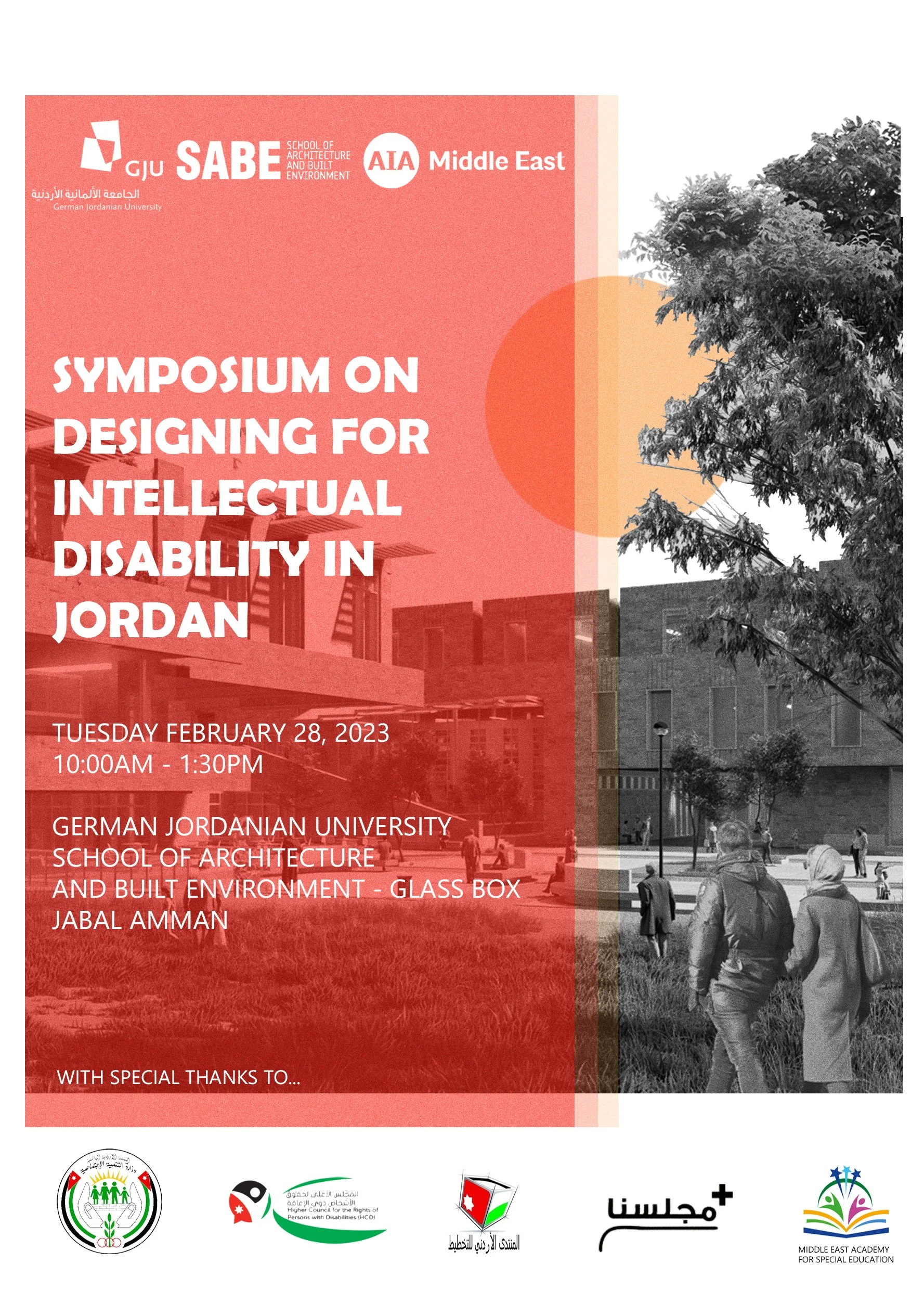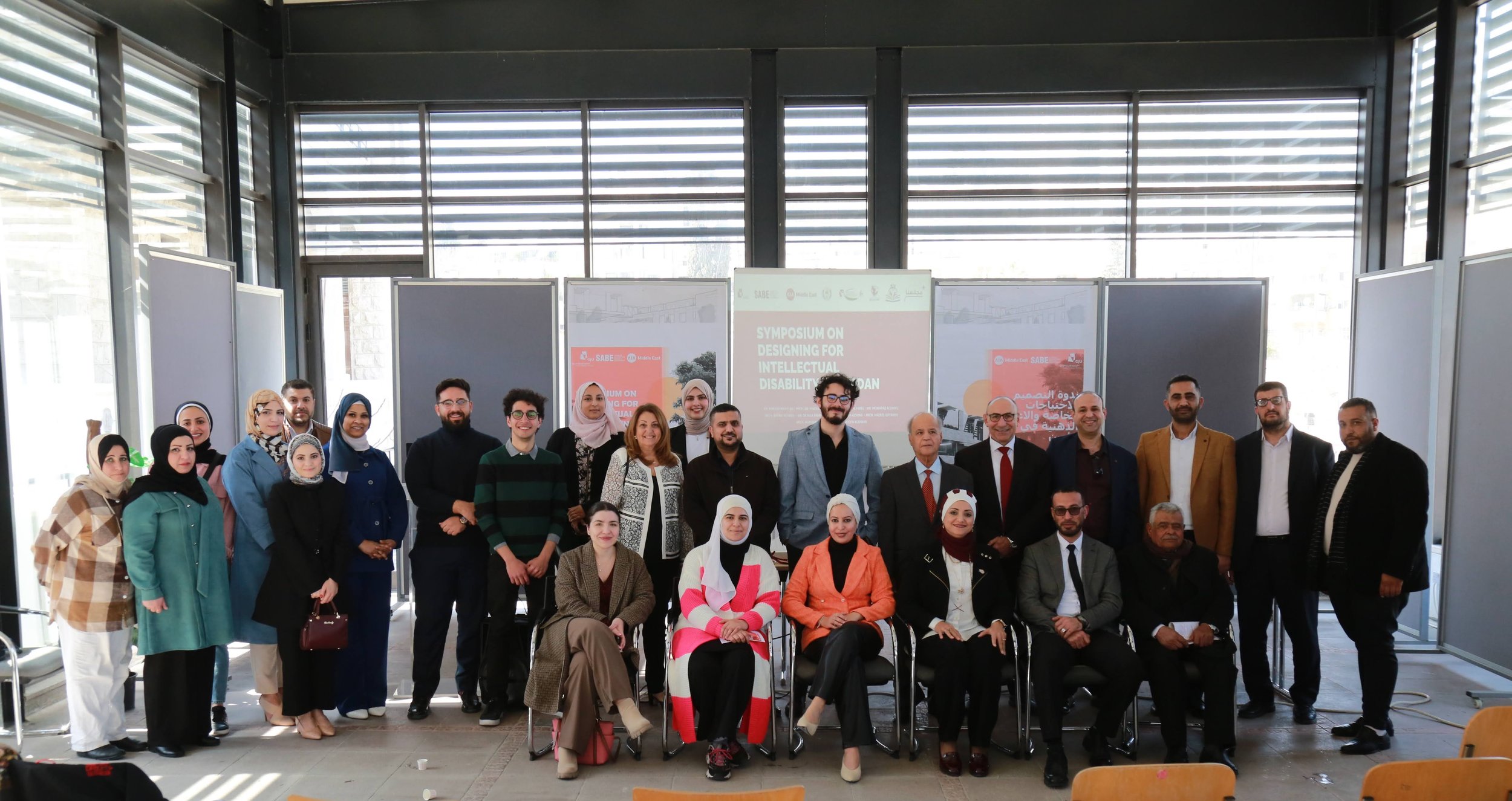
AIA Symposium - Designing for Intellectual Disability in Jordan.
On the 28th of February 2023 in the Jabal Amman School of Architecture campus, the symposium on designing for intellectual disability in Jordan was held, and is an extension of my graduation project “Open Sanctuary 2027”, a response to bill (20) 2017 for the affairs of the disabled. The symposium, patroned and sponsored by The American Institute of Architects (AIA) Middle East, brought speakers from the Ministry of social development, the upper council, professors, specialists and consultants in the field of special education, as well as architects and urbanists. The symposium brought speakers and attendees from organizations and institutions such as Jordanian Planning Committee, Majlisna for social development, the middle east academy for special education, representatives from the Autism Society Jordan, as well as numerous families of intellectually disabled members. We discussed what intellectual disability is, the social climate surrounding it in Jordan, policy making and legislation for this demographic and its impact on the private and public sector, urban design and planning for spatial justice and inclusion, and the architectural strategies relating to intellectual disability, to promote awareness and target the general public, but at the same targeting higher authorities by presenting this project as a proposal.
The symposium consisted of 2 sessions. The first session was on the state of intellectual disability in Jordan, bringing in Dr. Khaled Maaytah, minister of social development to discuss the law and its implementations, Dr. Hashem Alabbadi, who discusses intellectual disability from the view of the private sector, Dr. Farouq Rousan, professor and specialist of intellectual disability and Mr. Muwafaq Alzamel, chairman of the Jordanian Autism Society. The second session was the main session for design, architecture and urbanism. Theoretical and practical presentations were held, such as toolkits and local development projects involving integrated housing (by Muhsen Albawab ) , spatial justice and the right to the city (by Dr. Deyala Tarawneh , Ghayda Alsona and Hadeel Qatamin ) and neurodivergent design and spatial strategies (by Mohammad Abdel Qader Alfar). My graduation project (a 5-minute integrated neighborhood + day center) and other architectural and political recommendations will be submitted to the official authorities (Ministry of Social Development and Upper Council) for study and consideration, as a response to bill (20) 2017.
Higher authorities met with architects and urbanists, so that intellectual disability design got the much-needed spotlight it deserves with media coverage and awareness from Roya TV and Jordan TV, two very prominent media stations in Jordan. Despite the very little standards, guidelines and political frameworks surrounding the design for the intellectually disabled, we were able to hold necessary conversations on the state of intellectual disability in Jordan, and more importantly, how to design for it… with the symposium serving as a platform for this exchange!
Moving forward, the project will continue to try to make noise and promote a comprehensive design strategy as a response to the bill. Recommendations to the higher authorities on behalf of myself and the universities are as follows. The recommendations were summarized as follows:
1. Forming specialized committees to detect the extent of conformity of collective homes and homes (alternative accommodation) and their suitability for special cases in terms of design, furnishing and safety before the beneficiaries join.
2. Requiring that families receive appropriate training and pass the predetermined success criteria at the hands of specialists, and that should be done periodically.
3. Requiring families to involve the beneficiary in day care, specialized and rehabilitative services, according to the status of each case.
4. Coordination between the official authorities and the specialists in the day centers to supervise the shelter alternatives.
5. Coordination between official and private agencies to support vocational rehabilitation and employment for merged cases.
6. Shedding light on the design of this symposium, which was presented by Arch. Rayan Alfadel, a graduate of the German
Jordanian University, and emphasizing on the official authorities to consider adopting this innovative project.
7. Integration is for simple and some moderate cases that can be rehabilitated. As for severe and some moderate cases that cannot be integrated, they must continue in governmental and private residential institutions under constant monitoring by the Ministry of Social Development, not the Ministry of Health.
8. Preparing appropriate and safe homes (collective / families according to our culture) and licensing them annually from the Civil Defense and the Ministry of Health, and then the Ministry of Social Development, and finding the best for average cases in a way that suits our society and our customs.
9. Existence of a requirement to work intensive programs for excursions, swimming, horseback riding, and other various activities for residents of collective homes, natural homes, and other suitable homes for simple, medium, and severe cases, according to the situation of the cases, especially in the spring and summer seasons.
10. The existence of appropriate instructions for simple and some medium cases that will be combined to rehabilitate them in accordance with the environment and infrastructure, and the application of these instructions with continued follow-up and periodic auditing by the Ministry of Social Development and other oversight bodies, as is the case in shelter centers now.
11. Providing governmental facilities for centers for people with day and night disabilities, except for severe cases, such as buses, furniture and the required equipment without customs and taxes to facilitate the lives of beneficiaries using modern means.
12. Adopting specific standards that are updated annually and are clear for oversight. All official bodies are detected and monitored according to these standards, and they are known to the various centers to work on their implementation and follow-up.
13. Appropriate a design for people with disabilities is one of the necessities to improve their conditions. Speakers and attendees at the symposium recommend considering the proposal submitted by Arch Rayan Alfadel to design a comprehensive day center with inclusive housing, facilities and parks. The proposal will be submitted by the university upon request and interest in this innovative project.
14. That all day and residential centers, including centers concerned with elderly care, palliative centers, and severe disability centers, be subject to accreditation and preparation in coordination with the Accreditation Council for Health Affairs to prepare and operate them.
Media Coverage:









